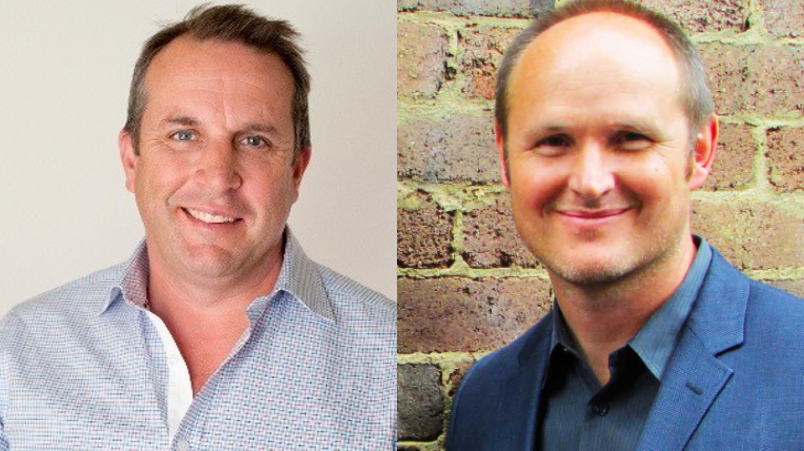Mediabrands investment boss Nick Durrant quits to do nothing - but not a jaded journeyman for ‘The Great Resignation’

L-R: Mediabrands boss Mark Coad and the departing Nick Durrant. “It wasn't like I wasn't enjoying the job or I was jaded. It's not a great resignation in the sense of I'm over my job and I want to do something different."
Mediabrands investment arm MagnaGlobal will lose its Managing Director, Nick Durrant, in August for a likely two-year sabbatical in which he and his family will base themselves in the UK and do nothing. The timing was right in the Durrant family lifecyle for the move but Durrant is no burnt out, jaded pin-up for The Great Resignation. Just ask him.
- Nick Durrant will leave Mediabrands in August, move his family to the UK, put the kids in school and travel for up to two years and “do some education or something”.
- Durrant says there were “absolutely no push factors. I love working, and love working at IPG and I’ve got a lot of time for [Mediabrands CEO] Mark Coad”.
- He’ll return to Australia and look for a job in two years – but there won’t be a “massive revolution” while’s he gone.
- Broadcast-scale addressable media will be the biggest mover when he returns and over the next five years.
Mediabrands investment boss Nick Durrant is calling time on a 20-year stint in Australia to return to the UK and drop out for two years. But he’s no disciple of the Covid-induced Great Resignation – a term which has been somewhat bastardised from the early sociological Covid drivers for a mass reappraisal of work, life and location. Now it tends to be simply a term to describe widespread job churn.
“It wasn't like I wasn't enjoying the job or I was jaded," Durrant told Mi3. “It's not a great resignation in the sense of I'm over my job, I want to do something different. It's absolutely not that. You’ve got people talking about challenging business models and so-on. While all those things are true to a greater or lesser degree, I genuinely enjoy my job. I love the people I work with. We just really decided that from a family perspective, we had that opportunity to do something completely different at the right time in terms of kids, schooling and everything. And so we just took it. We just want to take a break as a family. We will take a year, maybe two years out, go over to the UK, base ourselves over there, the kids will go to school there. My wife and I will just basically move around, do some education or something, and then we'll just do a lot of traveling and see the world. We talked about, 'wouldn't it be great to go and spend a year or two just having fun with the kids and not having to go to work every day'.” Indeed.
Durrant, who will turn 50 while attempting to lay claim to the world’s longest holiday, argues the media and agency sectors are under more pressure than they’ve ever been but it’s a “darn sight better than working in consulting or investment banking for me.” He says there are challenges and they are acute but admonishes the industry to “not lose sight of the fact it's also a fun industry and you can do some great work and you can work with some great people. The opposite of all of those things is true too but I still think it's a cracking industry to work in.”
Durrant intends to return to Australia and doesn’t think he’ll be left behind by the pace of change. He thinks the industry looks for revolution every year and it doesn't happen. “There won't be a revolution over the next two years,” he says. “You will be doing things broadly the same, but slightly differently. And those slight differences will be quite significant when aggregated together but there won't be a massive revolution. The evolution of our media mix will be slightly different to what it is now. But it won't be revolutionary.”
Broadscale media and advertising personalisation will, however, be a revolutionary exception in five years, Durrant says. Equally, what might be deemed creepy today by consumers will fade. “If I'm a dog owner and I live in Cremorne and the ad I'm getting is talking about walking my dog in my local park, I might find that creepy now, but in five or 10 years' time I won't, because that will become normal.
“We’re talking about addressability but at broadcast scale. We’ll talk to a million people, not 50,000 people, and for me that's the really exciting development. That's where our industry starts to get really exciting and really interesting - how we start to tailor messages for the greater audience understanding, but more importantly, greater audience delivery. The idea that hyper personalisation is a turn off or doesn't really work - that's today's thinking, because the frames of references that we have are all frames of references that exist within today's advertising world. But if I think in four or five years' time, when we have the opportunity to digitally make content for individuals using AI for really localised elements, I think that will become acceptable to clients, that will become acceptable to consumers.”
But first, to that long holiday.
Mediabrands CEO Mark Coad said he admired Durrant's commitment to take time out for his family and said a search for his replacement had started.
